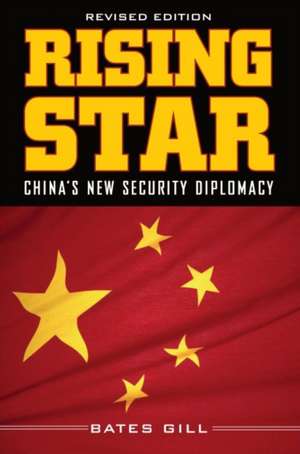Rising Star: China's New Security Diplomacy
Autor Bates Gillen Limba Engleză Paperback – 15 mar 2010
China's diplomatic strategy has changed dramatically since the mid-1990s, creating both challenges and opportunities for other world powers. Through a combination of pragmatic security policies, growing economic clout, and increasingly deft diplomacy, China has established productive and increasingly solid relationships throughout Asia and around the globe. Yet U.S. policymakers are still trying to comprehend these critical changes. Rising Star provides a coherent framework for understanding China's new security diplomacy and guiding America's China policy.
Bates Gill has completely updated his original analysis, focusing on Chinese policy in three areas: regional security mechanisms, nonproliferation and arms control, and questions of sovereignty and intervention. Looking to the future, he offers specific recommendations for a balanced and realistic approach that emphasizes what China and the United States have in common, rather than what divides them. The main arguments and recommendations of the original book continue to hold true and, in many respects, are more compelling now than ever before given China's continued ascendancy.
Bates Gill has completely updated his original analysis, focusing on Chinese policy in three areas: regional security mechanisms, nonproliferation and arms control, and questions of sovereignty and intervention. Looking to the future, he offers specific recommendations for a balanced and realistic approach that emphasizes what China and the United States have in common, rather than what divides them. The main arguments and recommendations of the original book continue to hold true and, in many respects, are more compelling now than ever before given China's continued ascendancy.
Preț: 231.51 lei
Nou
Puncte Express: 347
Preț estimativ în valută:
44.31€ • 48.15$ • 37.25£
44.31€ • 48.15$ • 37.25£
Carte tipărită la comandă
Livrare economică 21 aprilie-05 mai
Preluare comenzi: 021 569.72.76
Specificații
ISBN-13: 9780815704539
ISBN-10: 0815704534
Pagini: 267
Ilustrații: black & white illustrations
Dimensiuni: 152 x 229 x 16 mm
Greutate: 0.41 kg
Ediția:Second Edition
Editura: Brookings Institution Press
Colecția Brookings Institution Press
ISBN-10: 0815704534
Pagini: 267
Ilustrații: black & white illustrations
Dimensiuni: 152 x 229 x 16 mm
Greutate: 0.41 kg
Ediția:Second Edition
Editura: Brookings Institution Press
Colecția Brookings Institution Press
Notă biografică
Bates Gill is director of the Stockholm International Peace Research Institute. He was formerly the Freeman Chair in China Studies at the Center for Security and International Studies, and he was the first director of the Center for Northeast Asian Policy Studies at the Brookings Institution.
Descriere
China's diplomatic strategy has changed dramatically since the mid-1990s, creating both challenges and opportunities for other world powers. Through a combination of pragmatic security policies, growing economic clout, and increasingly deft diplomacy, China has established productive and increasingly solid relationships throughout Asia and around the globe. Yet U.S. policymakers are still trying to comprehend these critical changes. Rising Star provides a coherent framework for understanding China's new security diplomacy and guiding America's China policy.
Bates Gill has completely updated his original analysis, focusing on Chinese policy in three areas: regional security mechanisms, nonproliferation and arms control, and questions of sovereignty and intervention. Looking to the future, he offers specific recommendations for a balanced and realistic approach that emphasizes what China and the United States have in common, rather than what divides them. The main arguments and recommendations of the original book continue to hold true and, in many respects, are more compelling now than ever before given China's continued ascendancy.
Bates Gill has completely updated his original analysis, focusing on Chinese policy in three areas: regional security mechanisms, nonproliferation and arms control, and questions of sovereignty and intervention. Looking to the future, he offers specific recommendations for a balanced and realistic approach that emphasizes what China and the United States have in common, rather than what divides them. The main arguments and recommendations of the original book continue to hold true and, in many respects, are more compelling now than ever before given China's continued ascendancy.
